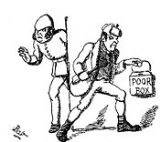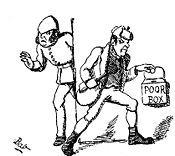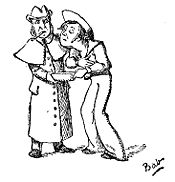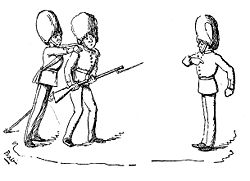
Topsyturveydom
Encyclopedia
Topsyturveydom is a one-act operetta
by W. S. Gilbert
with music by Alfred Cellier
. Styled "an entirely original musical extravaganza", it is based on one of Gilbert's Bab Ballads
, "My Dream". It opened on 21 March 1874 at the Criterion Theatre
in London and ran until 17 April, for about 25 performances. This was the first work shown at the newly built Criterion, and it was played together with An American Lady, written and performed by Gilbert's friend, the dramatist and Fun magazine founder, Henry J. Byron. The musical score to Topsyturveydom does not survive, but amateur productions in recent decades have used newly composed scores or performed the work as a non-musical play.
Advertisements for the work spelled the title "Topsyturveydom", whereas the license copy of the libretto
, filed with the Lord Chamberlain's office, and now held in the British Library, spells it "Topsyturvydom". Topsyturveydom is set in a quasi-utopia (reminiscent of Gilbert's earlier Happy Arcadia
(1872), or even Jonathan Swift
's Gulliver's Travels
), where things are the opposite of the norm. Party politics is lampooned, much as it would be two decades later in Gilbert and Sullivan
's Utopia, Limited
. As in that work, the king is a "detested" monarch. Gilbert also renews the idea of party politics working in a backwards way in Iolanthe
, where the House of Lords is threatened with obsolescence by having its members selected by competitive examination.
, about the redemption of a fallen woman; Rosencrantz and Guildenstern
, a parody of Hamlet
; a dramatisation of Ought We to Visit Her? (a novel by Annie Edwardes), an adaptation from the French, Committed for Trial, another adaptation from the French called The Blue-Legged Lady; and a play, Sweethearts
. He also wrote a Bab
-illustrated story called "The Story of a Twelfth Cake" for the Graphic Christmas number. Cellier produced his most successful early work, a full length comic opera
called The Sultan of Mocha. Gilbert was either too busy to see his own show, or else, disappointed by its lack of success with audiences, he had put it out of his mind. In a letter to T. Edgar Pemberton, author of the 1903 book on the Criterion Theatre, Gilbert wrote:
The Athenaeum
called the play "clever, but rather remote... an exercise rather than an amusement."
From the mid-1860s through the early 1870s, W. S. Gilbert
was extremely productive, writing a large quantity of comic verse, theatre reviews and other journalistic pieces, short stories, and dozens of plays and comic operas. His dramatic writing during this time was evolving from his early musical burlesques. Some of his work during this period exhibited a more restrained style, exemplified by a series of successful "fairy comedies", such as The Palace of Truth
(1870). At the same time, he was developing his unique style of absurdist humour, described as "Topsy-Turvy", made up of "a combination of wit, irony, topsyturvydom, parody, observation, theatrical technique, and profound intelligence". Topsyturveydom dates from the end of this period, during which Gilbert tried a variety of different styles and was working towards the mature comic style of his later work, including the famous series of Gilbert and Sullivan
operas.
From inside the King's reception room in Topsyturvydom, an inverted landscape is seen through the window. A chandelier sprouts from the middle of the floor, and chairs and tables hang upside-down. A ridiculous celebration has been planned, for the king is coming of age (having been born at 80, he is now to 59). The king is filled with pleasure when his courtiers express their hatred for him. They call him an ugly donkey and a detested monarch, which delights him. His mother comes to see him and says:
The king protests that he wants to "kick up his heels" for a few more years, and his mother replies, "Your sound common sense is simply disgusting." The king's grandmother, Tipto, who is so old that she is gaining "full possession of all her faculties" appears, and the king asks her to put down her childish science books, or he shall have to commit her to a "sane house". Tipto sings, "I always forget that I mustn't remember, But never remember I ought to forget."
Crapolee and Satis enter the reception room just as the courtiers sing the national anthem to the king, "Fiends dissect our Royal Master". They groan and hiss at him because they love him so. Satis says that he would like to see a session of Parliament. He learns that the legislators are all wealthy donkeys and that the seats in Parliament are bought and paid for. Satis states that in England, "Members are elected because they represent most faithfully the opinions of their constituents." The king's mother and grandmother enter holding a baby (the king's great grandmother). Thinking that Satis looks 74, ask him where his nurse is. He replies that he's not so old at all, only 52. He tells the king's mother that she is pretty, and she leaves in a huff.
Satis notes that the king's grandmother, Tipto, is beautiful, and says that he likes beautiful girls. Tipto admits that she is beautiful and says that she is not insulted. But, she wonders, how can an ugly old fellow like Satis care to talk to a beautiful young girl like her? Tipto is Satis proposes marriage to her. They can go to England and grow older, then come back and grow younger. Tipto says, "But we love one another.... People in this country only marry those they hate, and wretchedness is the invariable result... but I'm such a strange girl that I prefer happiness... but the idea of marriage - oh, it's too dreadful." She sings to him about the horrors of marriage.
The king returns and says that Satis has insulted his mother. Satis admits it. The king is overjoyed and offers him his mother as a bride. Satis declares that he loves the king's grandmother. The king is very angry and says "prepare to die". But the prime minister suggests a more hideous punishment: "He loves your grandmother and your grandmother loves him - let him marry her and spend a lifetime of uninterrupted bliss!" The king dispenses the horrible punishment: "Take her, and may a grandson's heartfelt blessing pursue you wherever you go!"
Operetta
Operetta is a genre of light opera, light in terms both of music and subject matter. It is also closely related, in English-language works, to forms of musical theatre.-Origins:...
by W. S. Gilbert
W. S. Gilbert
Sir William Schwenck Gilbert was an English dramatist, librettist, poet and illustrator best known for his fourteen comic operas produced in collaboration with the composer Sir Arthur Sullivan, of which the most famous include H.M.S...
with music by Alfred Cellier
Alfred Cellier
Alfred Cellier was an English composer, orchestrator and conductor.In addition to conducting and music directing the original productions of several of the most famous Gilbert and Sullivan works and writing the overtures to some of them, Cellier conducted at many theatres in London, New York and...
. Styled "an entirely original musical extravaganza", it is based on one of Gilbert's Bab Ballads
Bab Ballads
The Bab Ballads are a collection of light verse by W. S. Gilbert, illustrated with his own comic drawings. Gilbert wrote the Ballads before he became famous for his comic opera librettos with Arthur Sullivan...
, "My Dream". It opened on 21 March 1874 at the Criterion Theatre
Criterion Theatre
The Criterion Theatre is a West End theatre situated on Piccadilly Circus in the City of Westminster, and is a Grade II* listed building. It has an official capacity of 588.-Building the theatre:...
in London and ran until 17 April, for about 25 performances. This was the first work shown at the newly built Criterion, and it was played together with An American Lady, written and performed by Gilbert's friend, the dramatist and Fun magazine founder, Henry J. Byron. The musical score to Topsyturveydom does not survive, but amateur productions in recent decades have used newly composed scores or performed the work as a non-musical play.
 |
Advertisements for the work spelled the title "Topsyturveydom", whereas the license copy of the libretto
Libretto
A libretto is the text used in an extended musical work such as an opera, operetta, masque, oratorio, cantata, or musical. The term "libretto" is also sometimes used to refer to the text of major liturgical works, such as mass, requiem, and sacred cantata, or even the story line of a...
, filed with the Lord Chamberlain's office, and now held in the British Library, spells it "Topsyturvydom". Topsyturveydom is set in a quasi-utopia (reminiscent of Gilbert's earlier Happy Arcadia
Happy Arcadia
Happy Arcadia is a musical entertainment with a libretto by W. S. Gilbert and music originally by Frederic Clay that premiered on 28 October 1872 at the Royal Gallery of Illustration. It was one of four collaborations between Gilbert and Clay between 1869 and 1876. The music is lost...
(1872), or even Jonathan Swift
Jonathan Swift
Jonathan Swift was an Irish satirist, essayist, political pamphleteer , poet and cleric who became Dean of St...
's Gulliver's Travels
Gulliver's Travels
Travels into Several Remote Nations of the World, in Four Parts. By Lemuel Gulliver, First a Surgeon, and then a Captain of Several Ships, better known simply as Gulliver's Travels , is a novel by Anglo-Irish writer and clergyman Jonathan Swift that is both a satire on human nature and a parody of...
), where things are the opposite of the norm. Party politics is lampooned, much as it would be two decades later in Gilbert and Sullivan
Gilbert and Sullivan
Gilbert and Sullivan refers to the Victorian-era theatrical partnership of the librettist W. S. Gilbert and the composer Arthur Sullivan . The two men collaborated on fourteen comic operas between 1871 and 1896, of which H.M.S...
's Utopia, Limited
Utopia, Limited
Utopia, Limited; or, The Flowers of Progress, is a Savoy Opera, with music by Arthur Sullivan and libretto by W. S. Gilbert. It was the second-to-last of Gilbert and Sullivan's fourteen collaborations, premiering on 7 October 1893 for a run of 245 performances...
. As in that work, the king is a "detested" monarch. Gilbert also renews the idea of party politics working in a backwards way in Iolanthe
Iolanthe
Iolanthe; or, The Peer and the Peri is a comic opera with music by Arthur Sullivan and libretto by W. S. Gilbert. It is one of the Savoy operas and is the seventh collaboration of the fourteen between Gilbert and Sullivan....
, where the House of Lords is threatened with obsolescence by having its members selected by competitive examination.
Background
1874 was a busy year for both Gilbert and Cellier. Gilbert illustrated The Piccadilly Annual; supervised a revival of Pygmalion and Galatea; and, in addition to Topsyturveydom, wrote CharityCharity (play)
Charity is a drama in four acts by W. S. Gilbert that explores the issue of a woman who had lived with a man as his wife without ever having married. The play analyses and critiques the double standard in the Victorian era concerning the treatment of men and women who had sex outside of marriage,...
, about the redemption of a fallen woman; Rosencrantz and Guildenstern
Rosencrantz and Guildenstern (Gilbert)
Rosencrantz and Guildenstern, A Tragic Episode, in Three Tabloids is a short comic play by W. S. Gilbert, a parody of Hamlet by William Shakespeare...
, a parody of Hamlet
Hamlet
The Tragical History of Hamlet, Prince of Denmark, or more simply Hamlet, is a tragedy by William Shakespeare, believed to have been written between 1599 and 1601...
; a dramatisation of Ought We to Visit Her? (a novel by Annie Edwardes), an adaptation from the French, Committed for Trial, another adaptation from the French called The Blue-Legged Lady; and a play, Sweethearts
Sweethearts (play)
Sweethearts is a comic play billed as a "dramatic contrast" in two acts by W. S. Gilbert. The play tells a sentimental and ironic story of the differing recollections of a man and a woman about their last meeting together before being separated and reunited after 30 years.It was first produced on...
. He also wrote a Bab
Bab Ballads
The Bab Ballads are a collection of light verse by W. S. Gilbert, illustrated with his own comic drawings. Gilbert wrote the Ballads before he became famous for his comic opera librettos with Arthur Sullivan...
-illustrated story called "The Story of a Twelfth Cake" for the Graphic Christmas number. Cellier produced his most successful early work, a full length comic opera
Comic opera
Comic opera denotes a sung dramatic work of a light or comic nature, usually with a happy ending.Forms of comic opera first developed in late 17th-century Italy. By the 1730s, a new operatic genre, opera buffa, emerged as an alternative to opera seria...
called The Sultan of Mocha. Gilbert was either too busy to see his own show, or else, disappointed by its lack of success with audiences, he had put it out of his mind. In a letter to T. Edgar Pemberton, author of the 1903 book on the Criterion Theatre, Gilbert wrote:
- I am sorry to say that in my mind is an absolute blank to the opening of The Criterion. I never saw Topseyturveydom. If you happen to have a copy of it and could lend it to me for a few hours it might suggest some reminiscences: as it is I don't even know what the piece was about!
The Athenaeum
Athenaeum (magazine)
The Athenaeum was a literary magazine published in London from 1828 to 1921. It had a reputation for publishing the very best writers of the age....
called the play "clever, but rather remote... an exercise rather than an amusement."
From the mid-1860s through the early 1870s, W. S. Gilbert
W. S. Gilbert
Sir William Schwenck Gilbert was an English dramatist, librettist, poet and illustrator best known for his fourteen comic operas produced in collaboration with the composer Sir Arthur Sullivan, of which the most famous include H.M.S...
was extremely productive, writing a large quantity of comic verse, theatre reviews and other journalistic pieces, short stories, and dozens of plays and comic operas. His dramatic writing during this time was evolving from his early musical burlesques. Some of his work during this period exhibited a more restrained style, exemplified by a series of successful "fairy comedies", such as The Palace of Truth
The Palace of Truth
The Palace of Truth is a three-act blank verse "Fairy Comedy" by W. S. Gilbert first produced at the Haymarket Theatre in London on 19 November 1870, partly adapted from Madame de Genlis's fairy story, Le Palais de Vérite. The play ran for approximately 140 performances and then toured the British...
(1870). At the same time, he was developing his unique style of absurdist humour, described as "Topsy-Turvy", made up of "a combination of wit, irony, topsyturvydom, parody, observation, theatrical technique, and profound intelligence". Topsyturveydom dates from the end of this period, during which Gilbert tried a variety of different styles and was working towards the mature comic style of his later work, including the famous series of Gilbert and Sullivan
Gilbert and Sullivan
Gilbert and Sullivan refers to the Victorian-era theatrical partnership of the librettist W. S. Gilbert and the composer Arthur Sullivan . The two men collaborated on fourteen comic operas between 1871 and 1896, of which H.M.S...
operas.
Roles
- Mr. Satis (M.P. For Ballotville) – J. Clarke
- King Patatra (Of Topsyturveydom) – F. Dewar
- Crapolee (His Prime Minister) – E. W. Garden
- Wilkins (A Footman) – Mr. Smith
- Quop – Miss Montgomery
- Crambo – Miss C. Brabant
- Serape (The Queen's Mother) – Miss Hughes (Mrs. Gaston Murray)
- Tipto (The Queen's Grandmother) (sopranoSopranoA soprano is a voice type with a vocal range from approximately middle C to "high A" in choral music, or to "soprano C" or higher in operatic music. In four-part chorale style harmony, the soprano takes the highest part, which usually encompasses the melody...
) – Fanny HollandFanny HollandFanny Holland was an English singer and comic actress primarily known as the creator of principal soprano roles in numerous German Reed Entertainments.-Life and career:... - Tiddyickle (The Queen's Great-Grandmother) – Dolly Wood
- Topsyturvey Courtiers, Etc.
- Note: although the libretto refers to Serape and Tipto as the Queen's mother and grandmother, they are actually the King's mother and grandmother. However, this may be another Topsyturvey element.
Scene 1: Home of Satis
The Prime Minister of Topsyturveydom arrives at the home of old Satis, a Member of Parliament. He describes his country as a land "where everything is conducted on principles the very reverse of those" in England. The people are born elderly and grow younger until they become infants. They start out wise and gradually forget everything, until at last their minds are a perfect blank. Folly is honoured, wisdom is despised, true beauty consists in making yourself ugly, and people walk on the ceiling with their heads on the floor. He has been comparing customs in the two countries and invites Satis to accompany him to Topsyturveydom. Satis readily agrees.Scene 2: King's reception room in Topsyturvydom
 |
From inside the King's reception room in Topsyturvydom, an inverted landscape is seen through the window. A chandelier sprouts from the middle of the floor, and chairs and tables hang upside-down. A ridiculous celebration has been planned, for the king is coming of age (having been born at 80, he is now to 59). The king is filled with pleasure when his courtiers express their hatred for him. They call him an ugly donkey and a detested monarch, which delights him. His mother comes to see him and says:
- My son! I have always been a careless and injudicious mother to you, and I am about to propose a most imprudent step. You are now of age, and it's high time you began to think of taking a wife. Several old and hideous princesses who are enormously poor have proposed for your hand, and I think it high time you began to think of making one of them unhappy.
The king protests that he wants to "kick up his heels" for a few more years, and his mother replies, "Your sound common sense is simply disgusting." The king's grandmother, Tipto, who is so old that she is gaining "full possession of all her faculties" appears, and the king asks her to put down her childish science books, or he shall have to commit her to a "sane house". Tipto sings, "I always forget that I mustn't remember, But never remember I ought to forget."
 |
Crapolee and Satis enter the reception room just as the courtiers sing the national anthem to the king, "Fiends dissect our Royal Master". They groan and hiss at him because they love him so. Satis says that he would like to see a session of Parliament. He learns that the legislators are all wealthy donkeys and that the seats in Parliament are bought and paid for. Satis states that in England, "Members are elected because they represent most faithfully the opinions of their constituents." The king's mother and grandmother enter holding a baby (the king's great grandmother). Thinking that Satis looks 74, ask him where his nurse is. He replies that he's not so old at all, only 52. He tells the king's mother that she is pretty, and she leaves in a huff.
Satis notes that the king's grandmother, Tipto, is beautiful, and says that he likes beautiful girls. Tipto admits that she is beautiful and says that she is not insulted. But, she wonders, how can an ugly old fellow like Satis care to talk to a beautiful young girl like her? Tipto is Satis proposes marriage to her. They can go to England and grow older, then come back and grow younger. Tipto says, "But we love one another.... People in this country only marry those they hate, and wretchedness is the invariable result... but I'm such a strange girl that I prefer happiness... but the idea of marriage - oh, it's too dreadful." She sings to him about the horrors of marriage.
The king returns and says that Satis has insulted his mother. Satis admits it. The king is overjoyed and offers him his mother as a bride. Satis declares that he loves the king's grandmother. The king is very angry and says "prepare to die". But the prime minister suggests a more hideous punishment: "He loves your grandmother and your grandmother loves him - let him marry her and spend a lifetime of uninterrupted bliss!" The king dispenses the horrible punishment: "Take her, and may a grandson's heartfelt blessing pursue you wherever you go!"
Musical numbers
- Duet (Crapolee and Satis) - "True beauty we hate and despise"
- Song (King) - "I do not prize a pauper's lot"
- Ballad (Tipto) - "Oh, sad is her state and beyond all apologies"
- Chorus - "Fiends dissect our Royal Master"
- Ballad (Tipto) - "Grows the little brook in going"
- Finale - "Monster, let this thought arrest you"

